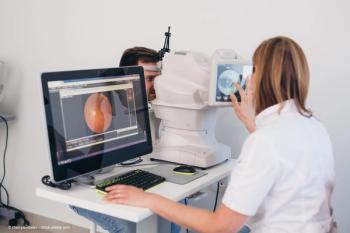
CTS 2025: Christine Kay, MD, on OPGx-LCA5 clinical results translated into real-life changes
Phase 1/2 interim results highlight real-world functional enhancements in patients with severe LCA5-related Leber congenital amaurosis.
Christine Kay, MD, presented interim 1-year data from a phase 1/2 study of an investigational gene therapy (OPGx-LCA5; Opus Genetics) for LCA5-related Leber congenital amaurosis at the Clinical Trials at the Summit 2025 annual meeting, held June 21 in Las Vegas, Nevada.1 “LCA5 is an inherited retinal disease,” Kay noted, caused by biallelic mutations in the gene encoding lebercilin. These patients are severely visually impaired from birth, making the therapeutic challenge significant but the potential impact profound. Kay is a vitreoretinal surgeon and inherited retinal disease specialist with Vitreo Retinal Associates in Gainesville, Florida.
The therapy under investigation is an AAV8-based subretinal gene therapy utilizing a promoter similar to that of voretigene neparvovec (Luxturna). The interim analysis focused on 3 adult participants in the low-dose cohort. “All of these patients had LCA5, genetically confirmed biallelic disease,” and presented with profound baseline vision loss—ranging from 20/200 to hand motion bilaterally.
Primary efficacy was assessed via a novel virtual mobility test, simulating the classic physical maze used in voretigene neparvovec’s trials. “This is a virtual maze that has been designed,” Kay explained, which patients navigated using virtual reality headsets and hand trackers. All 3 patients demonstrated functional improvement at 12 months. Two had clinically significant score gains, while the third—unable to complete the test at baseline—successfully navigated the course post-treatment. “So these measurements show a functional improvement in vision in these patients.”
Additional endpoints corroborated efficacy: visual acuity improved by an average of 3.5 lines (0.35 LogMAR), FST showed a 0.86 log unit gain in treated eyes, and one patient exhibited an 18-fold increase in macular sensitivity on microperimetry.
Importantly, the treatment was well tolerated with no SAEs or dose-limiting toxicities. “Patients tolerated this very well.” Pediatric dosing is now underway, and Kay noted, “I think things will continue moving in a positive direction.”
Kay is an advisor for Opus Genetics.
Reference
Kay C. OPGx-LCA5: Clinical results translated into real life changes. Presented at: Clinical Trials at the Summit 2025; June 21, 2025; Las Vegas, Nevada.
Newsletter
Keep your retina practice on the forefront—subscribe for expert analysis and emerging trends in retinal disease management.














































